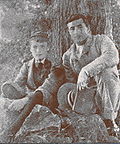
John Gambril Nicholson
Encyclopedia

England
England is a country that is part of the United Kingdom. It shares land borders with Scotland to the north and Wales to the west; the Irish Sea is to the north west, the Celtic Sea to the south west, with the North Sea to the east and the English Channel to the south separating it from continental...
school teacher, Uranian
Uranian
frame|right|From [[John Addington Symonds]]' 1891 book A Problem in Modern Ethics.Uranian is a 19th century term that referred to a person of a third sex — originally, someone with "a female psyche in a male body" who is sexually attracted to men, and later extended to cover homosexual gender...
poet, and an amateur photographer. He was the quintessential Uranian
Uranian
frame|right|From [[John Addington Symonds]]' 1891 book A Problem in Modern Ethics.Uranian is a 19th century term that referred to a person of a third sex — originally, someone with "a female psyche in a male body" who is sexually attracted to men, and later extended to cover homosexual gender...
, forming the center of that semi-underground world, and frequently writing introductions for and receiving dedications from his peers.
Biography
John Gambrill Nicholson (the Francis was added later and the -ll/-l spelling varied over the years) was born at Saffron Walden, Essex, the son of an ironmonger's assistant. He was educated locally at the King Edward VI Grammar School before entering upon his career (without any formal qualification) as an English Master at various schools in England and Wales: Buxton (1884-7); Ashton (1887-8); Rydal Mount School, Colwyn Bay (1888–94), where he also coached the football team; Arnold House School, Chester (1894-6); Stationers' School, Hornsey, north London (1896–1925, retired).His first book of poems Love in Earnest (1892) was dedicated to the memory of his mother, but the first section, a sequence of 50 numbered sonnets (which open with "Some lightly love, but mine is Love in Earnest -/My heart is ever faithful while it hears/An echo of itself in thine, though years/Should pass ere its full passion thou returnest"), was dedicated to "W.E.M." This was the flaxen-haired blue-eyed William Ernest Mather (1877–99) - second son of Sir William Mather - a pupil of his at Rydal Mount School 1888-90, who died young after being thrown from his horse A photograph of Nicholson with Ernest, taken at Llandudno in June 1889, was published in The Book Collector (Summer 1978). The dedicatees of other individual poems, referred to only by their initials, can be identified in many cases from the school register.
Nicholson's second volume of poetry A Chaplet of Southernwood (1896), celebrated the beauty of another Rydal Mount pupil (1891–94), William Alexander (Alec) Melling (1878–1962).
A third volume of verses A Garland of Ladslove (subtitled "Verses for Victor / To F.V.R. / (1902-1910)" was written for Frank Victor Rushforth (1888–1945), who entered the Indian Civil Service after university. As d'Arch Smith writes: "Nicholson's friendship with Victor began when the boy was thirteen. It was not altogether a happy relationship for it laboured under the usual difficulty that the boy was not able to respond to the ardour of Nicholson's passion.". "Southernwood" and "Ladslove" are alternative English names for the aromatic plant from southern Europe Artemisia abrotanum.
Nicholson's semi-autobiographical novel Romance of a Choir-Boy was written between 1896 and 1905 but not published until privately printed in 1916. In it his alter ego protagonist Philip Luard chastely pursues the unresponsive twelve-year-old Teddy Faircloth of the title, despite his friend Gerrard urging him to a more sensual approach. The novel ends with the quotation: "Physical intimacies are but surface emotions, forgotten as soon as they are satisfied; whereas spiritual intimacies live in the heart, they are part of our eternal life, and reach beyond the stars."
Nicholson was a member of the Order of Chaeronea
Order of Chaeronea
The Order of Chaeronea was a secret society for the cultivation of a homosexual moral, ethical, cultural and spiritual ethos. It was founded by George Cecil Ives in 1897, as a result of his realisation that homosexuals would not be accepted openly in society and must therefore have a means of...
, a secret society for homosexuals founded in 1897 by George Ives
George Cecil Ives
George Ives was a German-English poet, writer, penal reformer and early gay rights campaigner.-Life and career:...
.
Works
- Love in Earnest: Sonnets, Ballades, and Lyrics (London 1892)
- A Story of Cliffe School (Bradford c.1895)
- A Chaplet of Southernwood (Ashover [Derby] 1896)
- In Carrington's duty-week : a private school episode (london n.d. [1910]) — Internet Archive e-book
- A Garland of Ladslove (London 1911)
- Romance of a Choir Boy (London 1916)
- Opals and Pebbles (London 1928)

